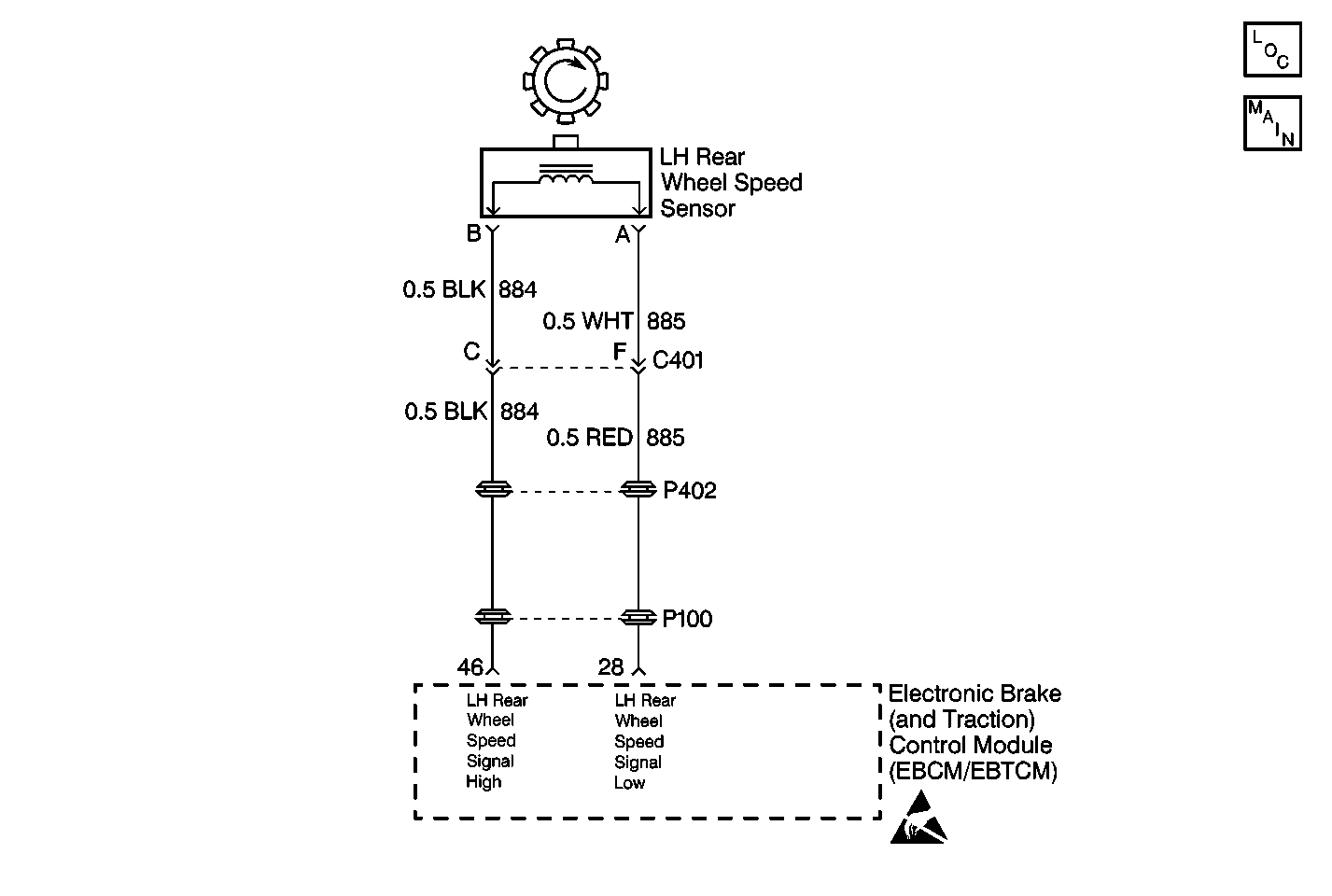
Circuit Description
The wheel speed sensor creates an AC voltage as each wheel turns. The frequency of the voltage is proportional to the wheel speed.
The voltage is magnetically induced. The voltage is caused by a toothed sensor ring (mounted on the drive axle) which passes the stationary pickup coil of the wheel speed sensor.
The EBCM/EBTCM uses the wheel speed sensor signal to calculate the following values:
| • | The vehicle reference speeds |
| • | The speed of each wheel |
| • | The acceleration |
| • | The slip values |
Use these values in order to determine when antilock or traction control (when equipped) is required.
Conditions for Setting the DTC
The EBCM/EBTCM performs two basic checks on the wheel speed sensors:
| • | Sensor continuity |
| • | Sensor output |
When the ignition is first turned to RUN, the EBCM/EBTCM performs the wheel speed sensor continuity check.
Action Taken When the DTC Sets
The following actions will be taken when the DTC sets:
| • | A malfunction DTC is stored. |
| • | The ABS is disabled. |
| • | The ANTILOCK indicator lamp is turned ON. |
Conditions for Clearing the DTC
The DTC will be cleared under following conditions:
| • | Conditions for the malfunction are no longer present. Use the scan tool clear DTCs function. |
| • | 100 ignition switch key cycles have passed with no malfunctions detected |
Diagnostic Aids
Any condition that causes a lack of continuity in the front wheel speed circuit could result in a DTC C1235 being set.
The following conditions may cause a lack of continuity in the front wheel speed circuit:
| • | An open |
| • | A short to ground |
| • | A short between the two wheel speed sensor circuits in the wiring harness between the speed sensor and the EBCM/EBTCM. |
An open or short to ground across the wheel speed sensor coil could also trigger this code.
Step | Action | Value(s) | Yes | No |
|---|---|---|---|---|
1 | Was the Diagnostic System Check performed? | -- | Go to Diagnostic System Check | |
2 |
Is the sensor or the wiring physically damaged? | -- | ||
3 | Repair or replace the components as necessary. Refer to Wiring Repairs in Wiring Systems or Rear Wheel Bearing and Hub Replacement in Rear Suspension. Is the repair complete? | -- | Go to Diagnostic System Check | -- |
4 |
Is the resistance within the specified range? | 850-1350 ohms | ||
5 |
Is the resistance within the specified range for both measurement A and measurement B? | OL (Infinite) | ||
6 | Replace the left rear wheel speed sensor. Refer to Rear Wheel Bearing and Hub Replacement in Rear Suspension. Is the repair complete? | -- | Go to Diagnostic System Check | -- |
7 |
Is the resistance within the specified range? | OL (Infinite) | ||
8 | Repair the short to ground in CKT 884. Refer to Wiring Repairs in Wiring Systems. Is the repair complete? | -- | Go to Diagnostic System Check | -- |
9 | Use the J 39200 in order to measure the resistance between the EBCM/EBTCM terminal 28 and the ground. Is the resistance within the specified range? | OL (Infinite) | ||
10 | Repair the short to ground in CKT 885. Refer to Wiring Repairs in Wiring Systems. Is the repair complete? | -- | Go to Diagnostic System Check | -- |
11 |
Is the resistance within the specified range? | 850-1350 ohms | ||
12 |
Is the resistance less than the specified value? | 2 ohms | ||
13 | Repair the open or high resistance in CKT 885. Refer to Wiring Repairs in Wiring Systems. Is the repair complete? | -- | Go to Diagnostic System Check | -- |
14 | Repair the open or high resistance in CKT 884. Refer to Wiring Repairs in Wiring Systems. Is the repair complete? | -- | Go to Diagnostic System Check | -- |
15 |
Is the voltage greater than the specified value? | 1 V | ||
16 | Repair the short to the voltage in CKT 884. Refer to Wiring Repairs in Wiring Systems. Is the repair complete? | -- | Go to Diagnostic System Check | -- |
17 | Use the J 39200 in order to measure the voltage between the EBCM/EBTCM terminal 28 and the ground. Is the voltage greater than the specified value? | 1 V | ||
18 | Repair the short to the voltage in CKT 885. Refer to Wiring Repairs in Wiring Systems. Is the repair complete? | -- | Go to Diagnostic System Check | -- |
19 | Replace the EBCM/EBTCM. Refer to Electronic Brake and Traction Control Module Replacement . Is the repair complete? | -- | Go to Diagnostic System Check | -- |
